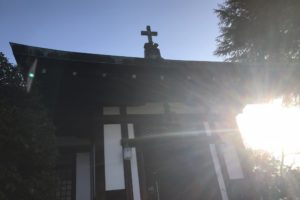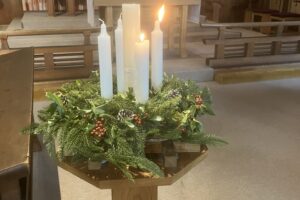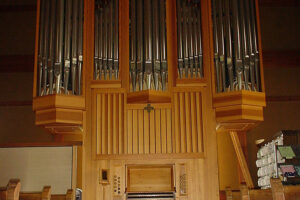2nd Sunday after Christmas Day, January 2, 2022
Matthew 2:1-12
Rev. Misa Furumoto
Merry Christmas and Happy New Year to you all. In the church calendar, we are still in the Nativity season, and today is the second Sunday after Christmas. Yesterday, January 1st was the Holy Name of our Lord, and this coming Thursday, January 6, is the Epiphany until when the Christmas season continues. The word “epiphany” in English according to Cambridge Dictionary means “a moment when you suddenly feel that you understand, or suddenly become conscious of, something that is very important to you”. So, what is it that suddenly becomes clear to us? Yes, that is the birth of the Savior, and it is an encounter with God. As we live our lives, there is a moment in each of us when we suddenly realize that there is God, that you are loved and kept alive by God, and that Jesus is walking right beside you. Coming across that moment is an epiphany.
In this morning’s Epistle reading, Letter to the Ephesians, Paul says, “I pray that the God of our Lord Jesus Christ, the Father of glory, may give you a spirit of wisdom and revelation as you come to know him, so that, with the eyes of your heart enlightened, you may know what is the hope to which he has called you.” This is the epiphany, the manifestation, when the eyes of the heart are enlightened and God is encountered. And the most important thing is that the eyes of the heart are enlightened in the darkness. This is illustrated in the Christmas story in the Gospel of Matthew which was just read.
In Old Testament times, the birth of the Savior was thought to be only for the Israelites who had made a covenant with God and kept the law given by God. However, God’s plan was actually much grander than that. The reason God sent His Son Jesus to earth was to show His love and save not only the Israelites, but all mankind, including each one of us. The Jews were chosen to prepare the way, and it was the wise men from the East who represented the Gentiles, who had the first experience of this Epiphany.
These wise men traditionally numbered three, Gaspar, Melchior, and Balthazar, but their number and names are not given in the Gospels. They are said to have been called three because the gifts they offered were three things: gold, frankincense, and myrrh. We have no idea if they were just two or a group of 15. Anyway, they discovered a star in the east that indicated the birth of the King of the Jews, and came to Jerusalem under the guidance of that star. They of course thought that a king must have been born in a palace.
Herod, the then King of the Jews, was horrified by the news of their visit. He felt that his position was threatened. It says that not only Herod, but all the people in Jerusalem were worried as well. This “people of Jerusalem” probably refers to the Jewish elite who served in the temple, the chief priests and scribes. They despised and hated the Gentiles who were not God’s chosen people. Those who did not keep or did not know the law given by God were considered sinners.
These creepy visitors, who probably looked strange and maybe even rode camels, were more than just Gentiles. They were people who were in the business of “astrology,” which to the Jewish leaders of the time was no different than the most disreputable form of witchcraft. Fortune-telling was strictly forbidden in the Torah. These people received the news of the birth of their king who would save Israel as recorded in the Old Testament and handed down from generation to generation. It was not in Judea, but in some unknown eastern country, and it was through the discovery of a star. It is not surprising that they were thought to be messengers of the devil.
But God used such people. He allowed people of questionable background, people who were not accepted by the society of that time, people who were not considered righteous in the world, to know the birth of the Savior before anyone else. And it was a light that shone in the darkness of the night that led them to the house where the Savior slept.
When Jesus began to preach the kingdom of God, the people who sat around his table were sinners, tax collectors, and prostitutes. It was the young children, who were symbols of the weak and without human rights at that time, who were told that the kingdom of God belonged to them. It was the poor, the sick, the lonely, and the hopeless who had their hearts opened by Jesus and experienced God’s love and encountered Him.
On the other hand, what about the so-called Jewish elite? They stubbornly rejected the words of Jesus, worked so hard to keep the law for themselves that they lost sight of love, which should have been the most important thing, and in the end they crucified Jesus and killed him. They seemed to have their eyes wide open, but the eyes of their hearts were closed.
The Second Letter to the Corinthians 4:18 says, “So we fix our eyes not on what is seen, but on what is unseen, since what is seen is temporary, but what is unseen is eternal.” Perhaps the twinkling star in the night sky that guided the wise men was only visible because it had their eyes open.
No one is sure how the year 2022 will come out, but we know that God has great plans for us that are far beyond our thoughts and wishes. He will work with those who love Him to make all things work together for good. Like the wise men from the east, let us keep the eyes of our hearts enlightened and walk toward the star shining in the darkness. It is only in the darkness that we can see the Lord.














